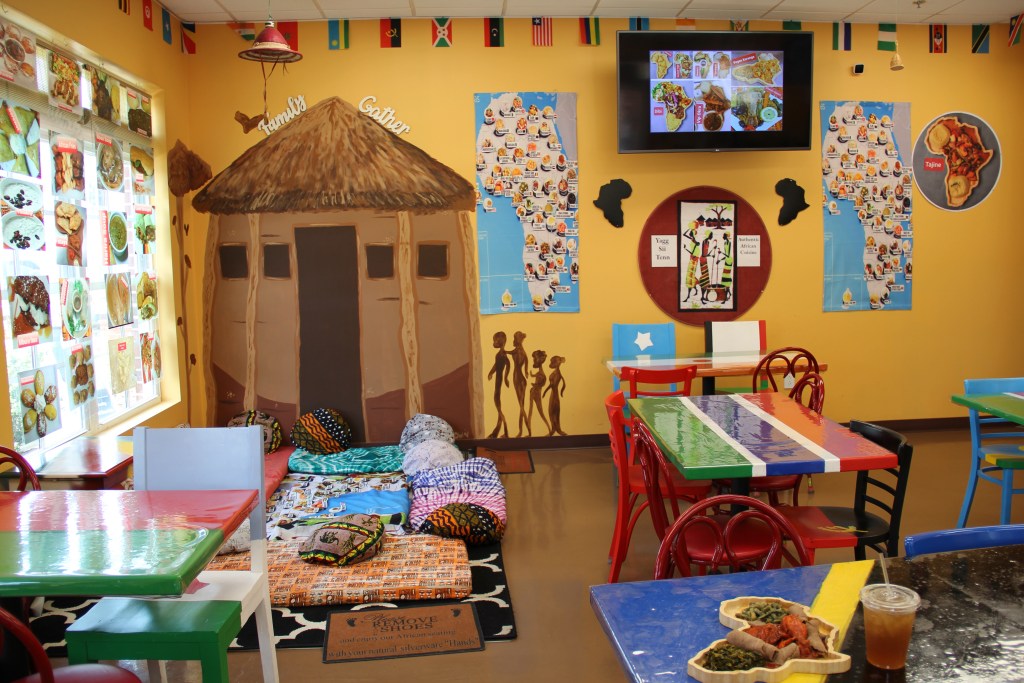When I walk into Yagg Sii Tenn, an African restaurant in Apex that shares a building with an urgent care center, the dining room is empty, so I take a few minutes to look around.
There’s a lot to take in. Tables and chairs are painted with flags from African countries—a visual representation of the restaurant’s pan-African approach rather than focusing on just one cuisine. One corner of the restaurant has pillows on the ground and a sign inviting diners to remove their shoes and eat “with your natural silverware”: hands.
Painted on the wall behind the pillows is a thatched-roof hut with wooden doors. Instruments hang from the ceiling—a gourd wrapped in a woven beaded net, a thumb piano. Two TVs are on, one playing a silent slideshow of menu dishes on the menu, the other airing the World Table Tennis Championship.
Suddenly, someone tall and smiling emerges from the kitchen wearing a nametag that says “Owner / Papa Fall.” He hands me a menu and instructs me to sit down and look it over. Before heading back to the kitchen, he points to a wooden xylophone-like instrument on the counter.
“If I’m in the back and I don’t hear you, just do this,” he says, using mallets to drum the instrument three times.
I sit down at the Tanzania table and study the menu. It’s extensive. Beyond the entrées—platters and sandwiches—there are beverages (ginger-turmeric lemonade, baobab cocktails), soups (cow feet with potatoes, spicy fish and carrots), appetizers (turkey, tuna, or vegan patties, “extremely spicy” piri-piri wings), sides (jolof rice, pounded yam), and desserts (apple beignets, curdled milk with millet couscous), with countries of origin listed next to each dish. I count at least two dozen African nations.
Most of the platters—of which there are more than 30, with chicken, seafood, goat, lamb, oxtail, vegetarian, and vegan options—run between $13 and $20, but there are a few within my price range. I’m eying the Senegalese yassa ganar platter (jerk chicken in citrus onion sauce for $11) or, to coordinate with my table, the Serengeti sandwich (a spinach wrap with grilled lamb for $9) when I notice a whiteboard in the front of the restaurant: LUNCH SPECIAL WITH MOROCCAN MINT TEA, $10.99.
more lunch money
Three options are listed: doro wat, fish curry over rice, and nambé.
I walk up to read the board more closely, and Papa Fall returns. When I mention I’m torn between the specials, he asks about dietary restrictions—the nambé (black-eyed peas and yucca in a chapati wrap) is vegan. No restrictions, I tell him.
“Do you do okay with spicy?” he asks. I nod. He recommends the doro wat and says it’s one of Ethiopia’s most famous dishes—chicken served with injera (a crepe-like flatbread), gomen (Ethiopian collard greens), and kilkil (green beans).
My bill for the special comes to $12.23 with tax. The tip options only allow whole dollar amounts, and without cash for exact change, I add $3, bringing my total to $15.23—slightly over budget, but only because of tip interface limitations.
Papa Fall asks whether I want my Moroccan mint tea sweet or unsweetened. Sweet, I tell him. He pours it from a large container behind the counter and hands it over. It’s both refreshing and comforting, marrying the soothing quality of peppermint tea when you’re sick with the cheerful sweetness of iced tea at a summer gathering.
About five minutes later, Papa Fall emerges with my food on a wooden platter shaped like the African continent, accompanied by a water pitcher. There’s a side table with utensils, but I opt to eat with my hands.

The doro wat consists of a bone-in chicken thigh and drumstick, bright red from berbere spice and swimming in a rich, complex sauce. Four rolls of injera are tucked around the edges of the platter. The chicken pulls apart easily, and the meat is infused with layers of heat that build without overwhelming. The collard greens are earthy and aromatic, flecked with chili and seeds. My favorite is the kilkil—cooling and gingery, a perfect counterpoint to the spiced chicken. I use pieces of the spongy injera to scoop everything up.
As I eat, Papa Fall stops by to check on me, and we chat for a bit. He’s from Senegal and, after moving to the U.S., spent 25 years working at TGI Fridays. When he would get off work, he says, he found himself frustrated by the options around him—Jersey Mike’s, Mexican places, and nowhere serving the kind of African food he was craving. Eventually, he decided to solve the problem himself.
He started Yagg Sii Tenn in 2012 as a food truck and expanded into catering and wholesale, with products like baobab powder and muscadine moonshine jelly, before opening this brick-and-mortar location two years ago. Through years of research, he developed a menu representing cuisines from across the African continent. When African diners walk in, sometimes driving hours or more to get here, “they look at the flags and see their country. They feel right at home,” Papa Fall says.
Before I leave, he explains the restaurant’s name, pointing to a circular artwork on the wall depicting women drawing water from a well. When he was young, living in a village in Senegal, he would see women drawing water like this, and they would be singing the words “yagg sii tenn,” he says.
“It basically means if you’re patient and you persevere, you shall get more water out of the well of the world,” Papa Fall says. “That stuck with me.”
Reach Staff Writer Lena Geller at [email protected]. Comment on this story at [email protected].

